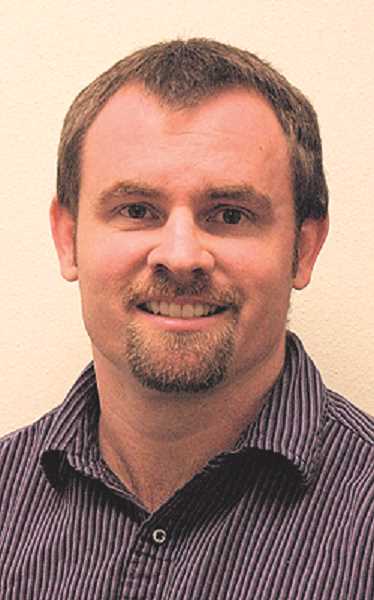Pamplin Media Group – Actually… cyberspace is the final frontier
If internet ‘facts’ can convince people the world is flat, it should be treated with the same respect and caution as outer space
 Captain James T. Kirk is incorrect. Space is not the final frontier.
Captain James T. Kirk is incorrect. Space is not the final frontier.
Yes, it is mysterious, dark and seemingly infinite. Yes, it is so expansive that many have speculated that other intelligence lifeforms might exist out there somewhere.
But space has got nothing on … cyberspace.
The World Wide Web, the internet – it, too, is a dark and mysterious place, seemingly infinite and so expansive that intelligent lifeforms might exist out there somewhere … although there’s probably better odds of finding that in space.
Lest you doubt me, consider for a moment that thousands upon thousands of people in cyberspace are convinced that the earth is flat. Not just convinced, but so certain that they will defend that stance as if their very lives depended on it.
I’ll never forget when I first learned this. My daughter and I had recently watched a helium balloon drift away into the upper reaches of the sky. Where does it go, she asked. I didn’t really know for sure, but my own childlike curiosity was piqued … and lucky for me, I have this pocket-sized computer equipped with the all-knowing Google. So, I looked it up … which led me to a YouTube video uploaded by a scientist who had attached a video camera to a weather balloon and sent it up, up and away.
Needless to say, the footage was fascinating, and I watched as the ground continued to shrink and the clouds and blue sky gave way to darker and darker surroundings. As the balloon floated closer and closer to space, the video footage reveals the unmistakable curvature of the earth below. Finally, due to changes in air pressure, the balloon expanded and burst, dropping back to earth several miles from its launch point.
I would never have seen any of this or known what really happens to helium balloons had I not watched this video. The internet, I thought to myself, is a marvel! Imagine the possibilities as technology continues to advance.
Then I made a big mistake and started reading the comments.
Comments – they are either the greatest way in mankind’s history to communicate, or they are a breeding ground for toxic bickering and mind-numbing idiocy. I haven’t decided yet.
In the case of the weather balloon, I was surprised. I expected comments about how amazing this was and how others had always wondered what happens to balloons that escape our grasp. Basically, I expected people to have the same thoughts as I did. It seemed reasonable. Instead, I was introduced to flat-earthers.
Up to that point, I assumed it was undisputed common knowledge that the earth is indeed a sphere. I had learned in school that Christopher Columbus had put to death any remaining belief that one could venture to, and perhaps fall off, the edge of this planet. This was fact, confirmed more than 500 years ago, right?
So, you can imagine my amusement when I read the first comment about the earth being flat. Hah, those silly, sarcastic commenters. Great joke! … But then I read some more and realized these people were serious – and they defended their beliefs with great passion and anger.
This was a few years ago and at the time, I chalked it up to being the view of a unique few. But as time passed, I began to see more and more flat-earth theories. This belief that defies half a millennium of science and decades of astronaut observations had actually grown! I was suddenly hoping they were right … so I could head to the edge of the earth and jump off and escape the insanity.
There are other examples of conspiracy theories out there that cyberspace has helped advance. For instance, it seems the moon landing was faked. If you don’t believe me, you can look it up. And did you know that aliens have visited our planet and the government has kept it under wraps for the past few decades? It has to be true, right? It’s on the internet.
I used to think these conspiracy theories and the mass infestation of divisive political “facts” that have flooded cyberspace were organically grown – just people in comment sections, chat rooms and social media passing stuff from one person to the next. Then, I came across a documentary that suggested these people – and the rest of us – were getting a little nudge.
The basic premise of the documentary is that social media platforms make their money from compiling and providing the data from our accounts and activity. Every click, every “like,” every moment spent on a particular item while scrolling is stored. And that information has value for businesses and for advocacy groups of different political persuasions.
This information is provided in the documentary by former employees of the different social media platforms, whose jobs were to program algorithms that put videos, memes and businesses in prominent locations. The intent is to slowly, over time, change your personal views and behaviors based on past tendencies.
The documentary mentioned the flat-earthers specifically. People who had searched other supposed conspiracy theories were exposed in their social media feeds to flat-earth advocates and information. And the effort worked. The flat-earther population exploded.
So, here we are, more connected than ever before – but more divided and polarized than ever. In a matter of seconds, we can find the answer to a nagging question – or get completely wrong information and spread it to others without knowing any better. We can connect with long-lost friends and family and have productive and meaningful conversations … or we can get into a belligerent, heated argument with complete strangers, showing little regard for civility and common decency.
Cyberspace – it is the new frontier. And in the same way astronauts on space shuttles respect the danger, darkness and enormity of space, we should approach this seemingly infinite world of the internet with caution. Don’t take every social media meme or video as gospel and be willing to verify what you see or hear with other reputable sources. Embrace human interaction and civil conversation and limit your time in the comment sections.
In short, we should treat cyberspace like the wild frontier that it is. It is worth the effort if we are going to avoid splintering further apart or believing everything the internet is selling. It is something we should be willing to go to the edge of the earth for … if it turns out there is such a thing.
You count on us to stay informed and we depend on you to fund our efforts. Quality local journalism takes time and money. Please support us to protect the future of community journalism.
*** This article has been archived for your research. The original version from Pamplin Media Group can be found here ***



